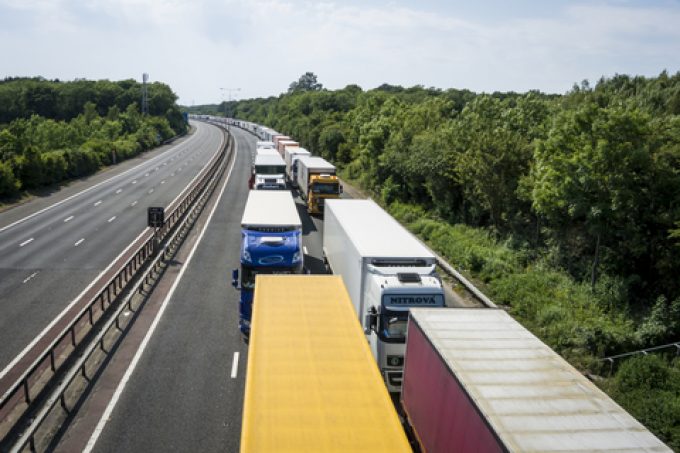UK to again delay start of checks on EU imports
Surprise, surprise: the UK government has decided yet again to delay import checks, it has ...

Hauliers are growing increasingly concerned by the confusion surrounding Brexit as the potential for a no-deal scenario intensifies.
A Department for Exiting the EU consultation paper reportedly says the onus should be on hauliers to travel with correct documentation, should Operation Brock come into force after a no-deal Brexit.
Operation Brock would see coastbound lanes of the M20 at junctions 8 and 9 reserved for HGV traffic and the middle lane kept clear for emergency vehicles.
A spokesperson for the FTA told The Loadstar the paper had not been made public, but rather “sent in letters to chief executives of logistics organisations”.
FTA policy manager for the south-east Heidi Skinner said there was a lack of clarity on what actual paperwork would be required.
“Without clarification, this paper blames potential delays at ports on the hauliers charged with keeping Britain trading after Brexit,” she said. “Those moving goods need clear instructions on how and where tariffs and documentation must be declared before Operation Brock is implemented.
“With less than three months until the UK’s departure from the EU, the pressure is mounting, with no help from government.”
New prime minister Boris Johnson this morning announced a further £2.1bn in funds, reportedly earmarked to pay for more customs officers across UK port networks – although, at 500, the numbers fall far short of the estimated 5,000 required.
And, as The Loadstar has previously reported, it takes more than two years to train customs officers, leaving questions on how border security would be enforced.
Road Haulage Association (RHA) has called on Mr Johnson to ensure borders between the UK and EU remain “free flowing”. Chief executive Richard Burnett said “huge challenges” remained if the country was to be ready for the 31 October deadline.
“Action from the government is welcome, but it’ll be a tall order to get businesses ready and new border staff recruited and trained in time,” he said.
“This is a big picture and what we badly need is detail… we need a complete, practical how-to guide to ensure traders know what they have to do to get across borders after Brexit.”
This view was echoed by the Confederation of British Industry (CBI), which has put forward some 200 recommendations on how to accelerate preparations on both sides of the Channel.
Deputy director general Josh Hardy said businesses were now “desperate” to move beyond Brexit.
“They have huge belief in the UK and getting a deal will open many doors that have been closed by uncertainty. There is a fresh opportunity to show a new spirit of pragmatism and flexibility… both sides are underprepared, so it’s in all our interests. It cannot be beyond the wit of the continent’s greatest negotiators to find a way through and agree a deal.”
Mr Hardy also called on the EU to commit “at the very least” to matching the mitigating steps the UK was planning to take noting that “failure to do so will hurt all our economies”.
“While the UK’s preparations to date are welcome, the unprecedented nature of Brexit means some aspects cannot be mitigated,” he continued. “We can reduce but not remove the damage of no-deal; it’s not just queues at ports, the invisible impact of severing services overnight would harm firms across the country.
“Preparing for no-deal is devilishly difficult. But it is right to prepare.”
It was reported last month that very few companies had registered for a new government online system designed to protect VAT revenues on foreign parcels in the event of no-deal.
The news led BIFA to question whether the government had been listening to industry advice and the latest consultation suggests its awareness of the industry is minimal, it said.
The FTA’s Ms Skinner added: “Effective traffic management is vital to ensure residents and businesses in Kent and the south-east can continue their daily lives smoothly and efficiently. But government plans around Operation Brock contradict its assertion there’ll be no delays at Channel ports, and indicate queues of vehicles are to be expected travelling to the coast.
“The fines system proposed by the government is unclear, with no indication of where and how fines are to be collected.
“And there is no indication of a ‘fast pass’ system for ‘just-in-time’ goods; the resulting delays could be disastrous for perishable or time-sensitive items,” she said.
Comment on this article